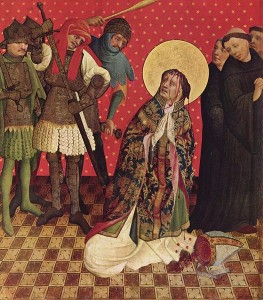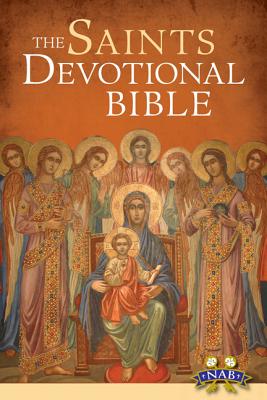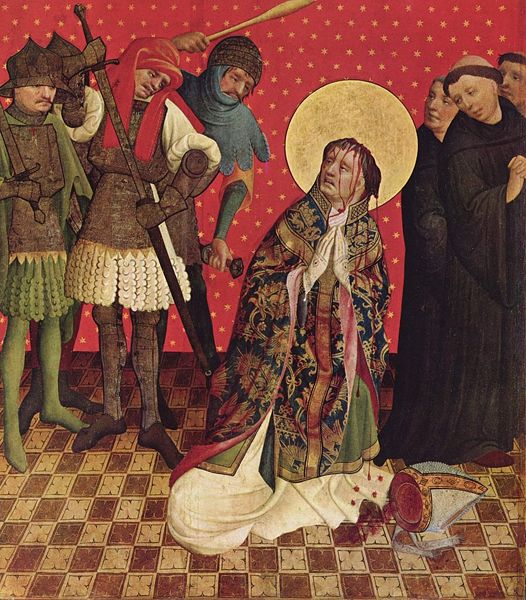Today we continue our regular series called “Learning from the Saints.” Our guide is expert Bert Ghezzi, a dear friend of mine and the author of numerous books including Voices of the Saints, Saints at Heart, and Discover Christ: Developing a Personal Relationship with Jesus.
His newest book is The Saints Devotional Bible, which illuminates the Scriptures with the saints’ own reflections. You can learn more about Bert and his work at BertGhezzi.com.
Today, Bert profiles St. Thomas Becket, a saint venerated as a martyr by both Catholics and Anglicans.
 In 1162, King Henry appointed his loyal friend, Thomas Becket, as Archbishop of Canterbury. For seven years, Becket had served him well as his chancellor. Thus the king expected that Thomas would continue to favor him. But Thomas had warned Henry that he would hate him as archbishop: “Several things,” he said, “that you do in prejudice of the rights of the church make me fear you would require of me what I could not agree to.” And things went as Thomas predicted.
In 1162, King Henry appointed his loyal friend, Thomas Becket, as Archbishop of Canterbury. For seven years, Becket had served him well as his chancellor. Thus the king expected that Thomas would continue to favor him. But Thomas had warned Henry that he would hate him as archbishop: “Several things,” he said, “that you do in prejudice of the rights of the church make me fear you would require of me what I could not agree to.” And things went as Thomas predicted.
The appointment drew a line across Becket’s life. The elegant statesman unexpectedly changed into a responsible churchman. Daily he celebrated mass, studied Scripture, distributed alms, and visited the sick. He dressed simply and wore a hair shirt. However, the character flaws that made Thomas a powerful chancellor—excessive self-confidence and obstinacy—persisted in the “new” Thomas. They also made him a powerful archbishop.
Inevitably, king and archbishop clashed. Thomas opposed Henry on issues of taxation, punishment of clerics by secular courts, and the right of appeal to Rome. Henry harassed Thomas with petty persecutions. The tension finally boiled over in 1164. After appealing to the pope, Thomas exiled himself to France.
By 1170, Thomas had repaired relations with Henry enough to return to England. But serious unresolved issues remained. Thomas complained to Henry in this letter:
“Christ, the judge of souls, knows how sincerely and affectionately I have made peace with you, believing that good faith and guilelessness were being shown to me. What other conclusion could I draw from your words. For whether you were agreeing or disagreeing with me, your speech expressed kindness toward me. And what other note, if not one of benevolence, peace and security, is sounded in the letters you sent to my lord the king, your son, ordering restitution to me and my men of all we held before we departed from England? But the guilelessness and good faith I heard in your words is not apparent in deeds. And this, God knows, grieves me less for the disadvantages to me than for the possible slur upon your honor.
“It is plain that the holy church of Canterbury, the mother in Christ of the Britons, is perishing because of the hatred directed at me. Rather than let her perish, I shall expose my head to the blows of my persecutors. I am ready not only to die for Christ, but to endure a thousand deaths and all manner of torments, if he by his grace will grant me the strength to suffer. I had wished, my lord, to call on you once more; but necessity draws me, afflicted as I am, to my afflicted church. With your permission, I shall return to it, perhaps to perish that it may live, unless you in your goodness come swiftly to my rescue.”
Thomas excommunicated several bishops who had coronated young Henry III without respect to his rights as Archbishop of Canterbury. For Henry II that was the last straw. “Who will rid me of this turbulent priest?” he shouted angrily. Feeling commissioned by the king, four knights went to Canterbury cathedral to kill Thomas.
Obstinate to the end, Becket resisted vigorously. He threw one knight to the ground. Another struck him with a sword. “For the name of Jesus,” said Becket, “and in defense of the church, I am willing to die.” Then Thomas submitted to their blows and they butchered him, giving him in death the sanctity his flaws had denied him in life.
“Although Thomas Becket had not always lived like a saint, he certainly died like one.”
—David Hugh Farmer
(Image Credit: Streams of the River)
Read more from Bert at his website www.BertGhezzi.com, or check out his many books on Amazon.
 |
 |
 |
 |


